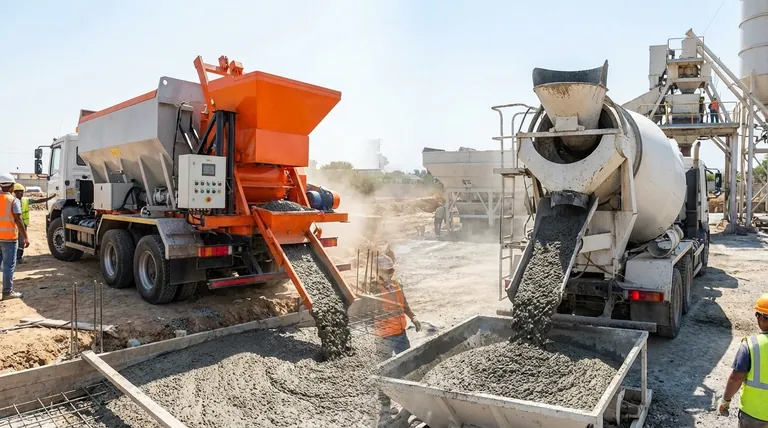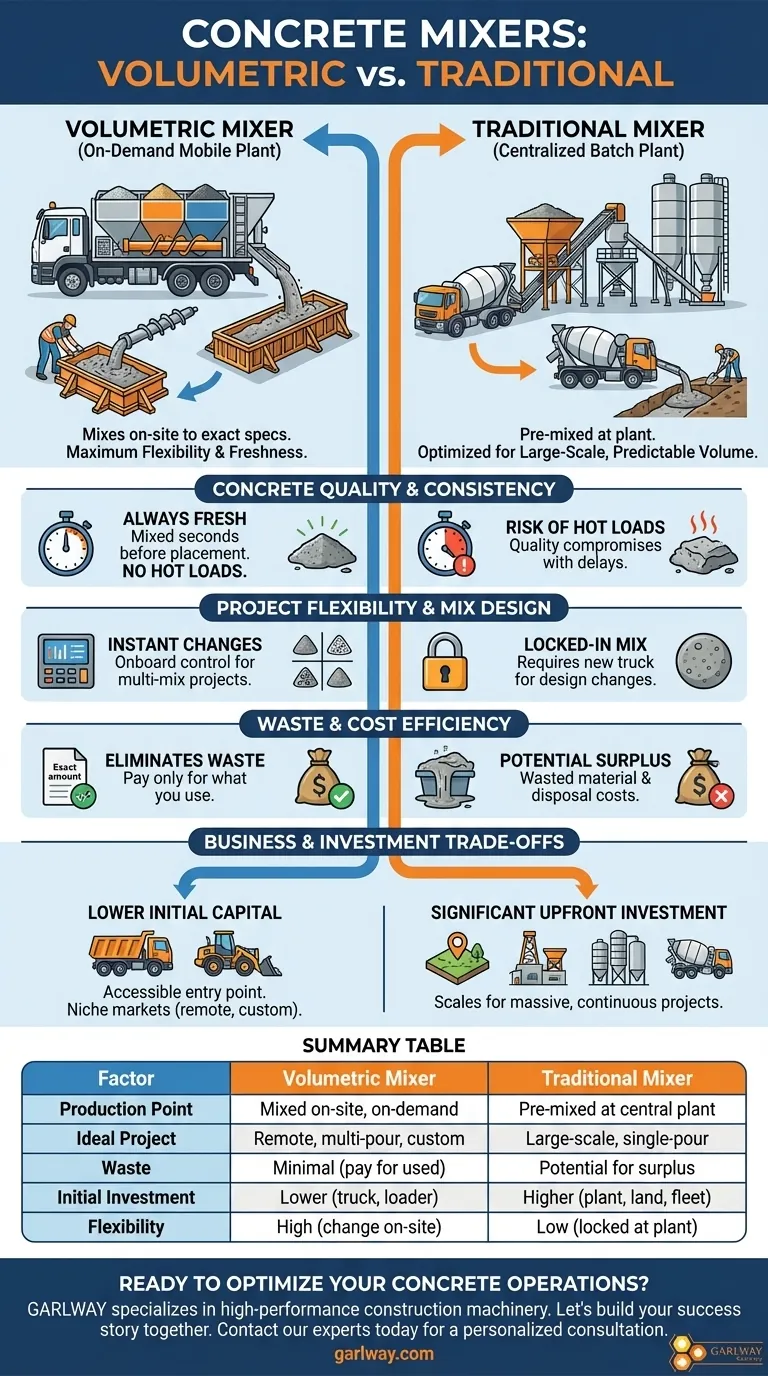In choosing a concrete mixer, the decision hinges on whether your project demands on-demand flexibility and precision or relies on large-scale, predictable volume. A volumetric mixer functions as a mobile batch plant, mixing fresh concrete on-site to exact specifications, while a traditional drum mixer transports pre-mixed concrete from a central plant.
The core difference is control: Volumetric mixers give you control over mix design, volume, and timing directly at the job site, minimizing waste. Traditional mixers centralize control at the batch plant, prioritizing logistical efficiency for large, standardized pours.

The Fundamental Difference: Where the Concrete is Made
The primary distinction between these two systems is the point of production. This single factor dictates their operational strengths, weaknesses, and ideal use cases.
Traditional Mixers: The Centralized Batch Plant Model
A traditional ready-mix operation uses a large, stationary batch plant to mix concrete. All raw materials—cement, sand, aggregate, and water—are combined here according to a specific recipe.
The finished product is then discharged into a drum mixer truck. The drum rotates during transit to prevent the concrete from setting before it reaches the job site.
This model is built for scale and consistency across very large volumes. It operates like a central kitchen preparing bulk meals for delivery.
Volumetric Mixers: The On-Demand Mobile Plant Model
A volumetric mixer is effectively a batch plant on a truck chassis. It carries all the individual ingredients in separate compartments.
Water, sand, stone, and cement are mixed on-site, in the exact quantity needed, moments before the pour. Modern units use digital control systems to ensure precise and repeatable mix designs.
This model provides maximum flexibility and freshness. It operates like a high-end food truck, cooking each order on demand to the customer's exact specification.
Key Decision Factors Analyzed
Your project's specific needs will determine which model is more advantageous. Consider these critical operational factors.
Concrete Quality and Consistency
Traditional drum mixers begin a countdown the moment they are loaded. Delays in traffic or on-site can lead to a "hot load," where the concrete begins to harden, compromising its quality and strength.
Volumetric mixers eliminate this risk entirely. The concrete is always fresh, mixed just seconds before it's placed, ensuring maximum quality and workability.
Project Flexibility and Mix Design
With a traditional mixer, the mix design is locked in at the plant. If you need to change the concrete's strength or properties for a different part of the pour, you must order a separate truck.
A volumetric mixer allows the operator to change the mix design instantly via its onboard control system. This is ideal for projects requiring multiple types of concrete or for making precise adjustments on the fly.
Waste and Cost Efficiency
Ordering from a batch plant often requires estimating your needs and ordering a surplus to avoid a shortage, leading to wasted material and disposal costs. You pay for the entire truckload, whether you use it or not.
Volumetric mixers produce the exact amount of concrete required. This eliminates waste entirely, meaning you only pay for the material you use.
Operational Logistics
Traditional mixers are excellent for single, large pours where a fleet of trucks can cycle efficiently. They are less suited for multiple small, remote, or after-hours jobs.
Volumetric mixers excel in situations requiring versatility: remote locations, utility repairs, or multiple small pours at different locations on the same day.
Understanding the Business and Investment Trade-offs
For those starting or scaling a concrete business, the financial and operational models are vastly different.
Initial Capital Expenditure
Starting a traditional ready-mix operation requires significant upfront investment. This includes purchasing land, building a batch plant, erecting silos, and acquiring a fleet of drum trucks.
A volumetric mixer business has a much lower barrier to entry. The primary investment is the truck and a loader, allowing a business to become operational with substantially less initial capital.
Scalability and Market Niche
Traditional operations scale by serving large commercial and infrastructure projects that demand massive, continuous volumes of a single type of concrete.
Volumetric businesses often serve niche markets that value flexibility and precision, such as municipal repair work, custom residential projects, and specialty concrete applications where waste reduction and on-demand service command a premium.
Making the Right Choice for Your Goal
Select the technology that directly aligns with your operational and financial objectives.
- If your primary focus is large-scale, predictable pours: A traditional ready-mix supplier is optimized for the volume and logistical efficiency these projects demand.
- If your primary focus is flexibility, remote work, or multi-mix projects: A volumetric mixer provides unparalleled control and eliminates waste, making it the superior choice.
- If your primary focus is starting a concrete business with lower initial capital: A volumetric mixer offers a more accessible entry point into the market with a versatile service offering.
Ultimately, your choice is a strategic decision between the industrial scale of centralized production and the surgical precision of on-site manufacturing.
Summary Table:
| Factor | Volumetric Mixer | Traditional Mixer |
|---|---|---|
| Production Point | Mixed on-site, on-demand | Pre-mixed at a central plant |
| Ideal Project Type | Remote, multi-pour, custom mix projects | Large-scale, single-pour, standardized projects |
| Waste | Minimal (pay for exact amount used) | Potential for surplus and disposal costs |
| Initial Investment | Lower (truck and loader) | Higher (plant, land, fleet) |
| Flexibility | High (change mix design on-site) | Low (mix design locked at plant) |
Ready to Optimize Your Concrete Operations?
Choosing the right mixer is crucial for your project's success, budget, and efficiency. GARLWAY specializes in providing high-performance construction machinery, including robust concrete mixers and batching plants, tailored for construction companies and contractors worldwide.
We can help you:
- Select the ideal equipment for your specific project requirements and business goals.
- Increase on-site efficiency and reduce material waste.
- Access reliable machinery built for durability and precision.
Let's build your success story together. Contact our experts today for a personalized consultation and discover how GARLWAY's solutions can power your projects.
Visual Guide

Related Products
- Belle Cement Mixer JS2000 Volumetric Concrete Mixer for Harbor Freight
- Harbor Freight JS1500 On Site Concrete Mixing Volumetric Cement Mixer
- JW1000 Mobile Cement Mixer Concrete Mixer Truck and Batching Plant
- Ready Mixer Machine for Construction Ready Mix Machinery
- Portable Concrete Mixer Machine Equipment for Mixing Concrete
People Also Ask
- What are the main advantages of volumetric concrete mixers? Achieve On-Demand Concrete & Cost Control
- What are the advantages of a volumetric concrete mixer? Achieve Total Control & Zero Waste
- What type of concrete mixer is volumetric? Gain On-Site Control & Eliminate Waste
- What is the difference between a volumetric concrete mixer and a concrete mixer? Choose the Right Mixer for Your Project
- What is the difference between volumetric concrete mixer and concrete mixer? Maximize On-Site Efficiency & Eliminate Waste



















